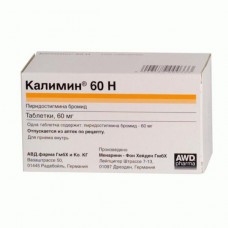Expiration date: 09/2026
The composition and form of issue:
Tablets. 1 tablet contains active substance:
pyridostigmine bromide 60 mg
excipients: MKC — 336 mg corn starch 120 mg povidone K25 60 mg silica colloidal anhydrous — 63 mg magnesium stearate 3 mg glutamic acid hydrochloride — 2 mg distilled water — 16 mg
in bottles brown glass with plastic cap with tamper-evident, 100 PCs. in cardboard pack 1 bottle.
Description pharmaceutical form:
White, biconvex, oblong tablets scored, smooth, solid edges and the same species.
Pharmacological action:
Inhibits cholinesterase and cause accumulation of acetylcholine in cholinergic synapses, potenziruet thus, cholinergic mediation.
Pharmacokinetics:
Cmax when administered in 1.5–3 h. bioavailability when administered orally is from 8 to 20%. T1/2 the on/in the introduction — 1.5 hours, following oral administration of 2.5 h due To the low solubility in lipids do not cross the BBB and has an impact mostly on the peripheral cholinergic system. Partially metabolized in liver to inactive metabolites, excreted by the kidney.
Clinical pharmacology:
Acts slowly and continuously. The effect diminishes slowly.
Indications:
Kalimin 60 N, Kalymin Forte: myasthenia gravis, myasthenic syndrome, atony of the gastrointestinal tract and the bladder.
Kalymin Forte: as a peripheral antagonist of non-depolarizing curare-like muscle relaxants, in case of poisoning with anticholinergic substances.
Contraindications:
Hypersensitivity, obstruction of the gastrointestinal tract, obstruction of the urinary tract, increased tone of the bronchial muscles (bronchial asthma, spastic bronchitis), in combination with the depolarizing muscle relaxants (suxamethonium), pregnancy, breast-feeding.
Application of pregnancy and breast-feeding:
Contraindicated. At the time of treatment should stop breastfeeding.
Side effects:
From the digestive tract: nausea, vomiting, diarrhea, paroxysmal abdominal pain, due to increased intestinal peristalsis.
From the nervous system and sensory organs: muscle tremors, muscle spasms, impaired accommodation of the eye.
From the cardiovascular system and blood (hematopoiesis, hemostasis): aetiology, hypotension.
Respiratory system: increased secretion of bronchial glands.
From the skin: rarely — rash.
Other: frequent urge to urinate, sweating, increased Slet and drooling.
Drug interactions:
Do effect derivative morphine, barbiturates and depolarizing muscle relaxants.
Method of application and dose:
Inside, squeezed water.
The initial symptoms of the disease -1/2 — 1 table. (30-60 mg) 1-2 times a day.
With the progression of the disease table 1-3. (60-180 mg) 2-4 times a day (60-180 mg).
The maximum daily dose is 12 tabs. (720 mg).
Dosing of pyridostigmine bromide in Myasthenia gravis is carried out strictly individually, depending on the severity of the disease and patients ' reaction to treatment. So the modes of doses recommended for this indication should be regarded as indicative.
Treatment of patients with kidney disease. Patients with kidney disease the drug is prescribed in lower doses, because of pyridostigmine bromide in unchanged form excreted in the kidneys. Therefore, the necessary dose is selected individually for each patient depending on the actions Preparata.
Overdose:
Symptoms: increased secretion of lacrimal, salivary and sweat glands, redness of skin, severe weakness, blurred vision, cramps, dizziness, nausea, vomiting, involuntary discharge of urine and feces, intestinal colic, bronchospasm, pulmonary edema, severe or increasing muscle weakness, paralysis of the respiratory muscles, hypotension, collapse, bradycardia, cardiac arrest or paradoxical tachycardia.
Treatment: slow in/with the introduction of atropine sulfate in a dose of 1-2 mg (if necessary, depending on the frequency of the pulse is repeated after 2-4 h), restoring and maintaining vital body functions.
Special instructions:
With great caution should be used with stomach ulcers, decompensated heart failure, myocardial infarction, hyperthyroidism, bradycardia, diabetes, liver and kidney, Parkinson's disease, after operations on the gastrointestinal tract.
Expiration date:
After first opening — 6 months.


